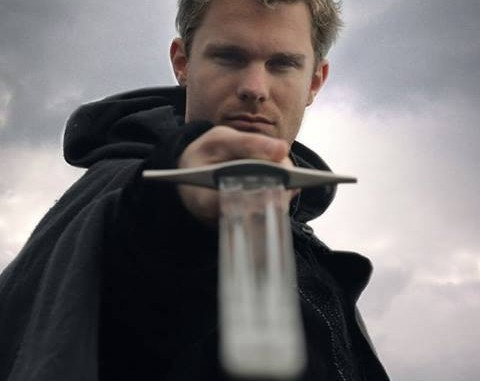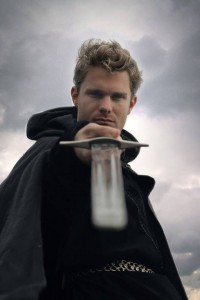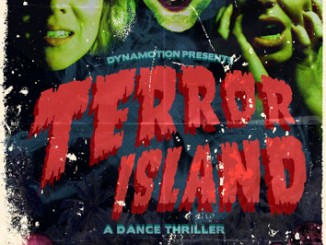
The Red Tragedy [by Matt Baker]

The problem with Hamlet as a play is that it treats character over plot. The success of Galatea Theatre’s production, therefore, is the casting of Calum Gittins as the titular Dane. Asides from his remarkable technique, Gittins’ performance is packed with pathos, giving full colour to the extreme range of Hamlet’s capricious nature. This is by no means an easy feat. Hamlet’s complexities arise from subconscious desire, something which cannot be played, so, instead, Gittins delivers each soliloquy as part of a mental process, an untangling of intangible ideas. The result is a series of deeply poignant moments, reflecting on matters ranging from existentialism to his own mortality, tied together with an ironically clear through line of action.
Gittins is also safely anchored by his three parental players, with Wayne Coreham brilliantly playing against the typical villainous of Claudius, giving us a portrayal of a man truly burdened and on an emotional par with Hamlet. Ian Harvey expertly balances the role of the specifically titled Ghost of Hamlet’s Father, allowing his mortal emotions to break through his haunting vocals, while Anna Stillaman as Gertrude is torn between the two, her emotional fragility bubbling beneath her stoic façade.
Terry Hooper exudes the prating art of Polonius, but in committing to such an extreme degree, misses the few moments of wisdom that shine through. Vocally, he is exaggeratedly excessive, but the adjustment to his tonal quality does not take long to make, and Hooper truly kicks into gear when working with strong objectives. While it is Gittins and Hooper who truly find their comedic moments, the Grave Digger, Brendan Lovell, and Rosencrantz and Guildenstern, Stuart Shacklock and Regan Crummer respectively, do not. Already the comic relief of the play, it is unnecessary for them to perform to the degree they do in regards to presenting the ideas of characters as opposed to simply playing actions.
Indigo Paul has a naturally youthful innocence in her portrayal of Ophelia, but with this comes a lack of emotional depth in her penultimate scene, though there is great promise in her craft. Both Gittins and Paul work well to illustrate the off-stage history of Hamlet and Ophelia’s relationship. The same cannot be said, however, for his relationship with Mark Huston as Horatio, with the latter having difficulty in interpreting the actions of his lines, resulting in a rather clumsy ending to the play. Similarly, Alex MacDonald, in one of the more difficult characters of the play, is not able to present a great variety in Laertes.
The production does not shy away from acknowledging its Game of Thrones style. Some of the cast look uncannily familiar and the wall of ice, while tacky (full detail or stylised minimalism either way would have been better suited) and massively light reflective, is an appropriate setting for the cabin-fever paranoia on which Hamlet plays. However, the modernity of Joy Division is simply far too incongruous, and is incredibly jarring, used erratically and in all too short bursts. Lighting too is extreme, and the hot reds and bright yellows contrast the melancholic blues and ghostly greens too greatly. There was also a missed opportunity of mirroring in the staging of Ophelia’s demise and Hamlet’s most famous speech, though the opportunity needn’t have happened at all. While it may have been for original casting restrictions, the passing of information verbally, and the reading and writing of letters is a specific device in Hamlet, and the acting out of these scenes was unnecessary. I can’t help but think that Tom Stoppard would have been disappointed with the loss of one of the play’s most quotable lines. Shakespeare’s best advice to actors is also missed. Ironic, as Player’s Brendan Lovell and Mike Borgfeldt needed to hear it the most.
Full credit must be given to both the leading cast and director John Goudge for presenting the dialogue incredibly clearly. More often than not even the most well versed Shakespearean fans will occasionally stumble while trying to follow every word of any production, however, I found myself able to ‘translate’ everything that was said in keeping with the pace of the piece. While Goudge’s direction led to some staging which was superfluous, such as Hamlet’s three stages of grief or his affrighting Ophelia, and some which missed the text, such as the King and Queen ‘following’ Laertes off-stage in a completely different direction, there is an overall clarity in the production. Hamlet is unexpectedly rarely staged and if this production is to be an example of the bar at which it is to be produced every 10 years (the show was last seen professionally in Auckland in 2003), Gittins’ Hamlet is one not to miss.
Hamlet is presented by Galatea Theatre and plays at the Mugrove Studio until 12th October. Details see The Maidment.
SEE ALSO: Theatreview.org.nz review by Nik Smythe




Leave a Reply